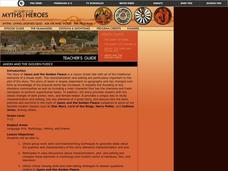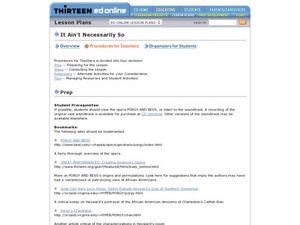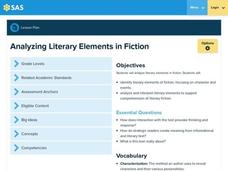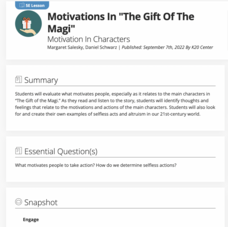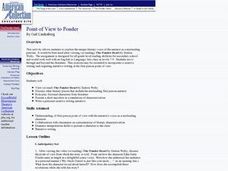Star Wars in the Classroom
"Shakespeare and Star Wars": Lesson Plan Days 8 and 9
How does an author's choice of artistic medium influence an audience? What about how an author chooses to transform original source material? These are the questions class members grapple with as they compare scenes from episode IV...
Star Wars in the Classroom
"Shakespeare and Star Wars": Lesson Plan Day 6
How can a screenplay create meaning and drama in ways that other forms of writing cannot? That is the question class members must answer as they compare the cantina scene of the screenplay for George Lucas's Star Wars: A New Hope with...
Star Wars in the Classroom
"Shakespeare and Star Wars": Lesson Plan Day 11
Class members take center stage as groups perform scenes from Ian Doescher's William Shakespeare's Star Wars: Verily, A New Hope. Actors are encouraged to add stage directions to the script, as well as create costumes and props to...
Star Wars in the Classroom
"Shakespeare and Star Wars": Lesson Plan Day 12
Class members compare the final 30 minutes of Lucas's Star Wars: A New Hope with Act V of Doescher's play, William Shakespeare's Star Wars: Verily, A New Hope and consider how the choice of media influences viewers' impression of the...
Curated OER
A Long Time Ago in the Future
Students read and discuss Canadian young adult literature. They compare/contrast the elements of citizenship, characterization, and themes, write journal responses, and identify the elements that define Canadians.
Curated OER
Fairytale Cake
Students recreate characters from the story, "The Fairytale Cake." In this fairy tale characterization lesson, students first listen to fairy tales read aloud. They then use play dough and plastic bowls as pretend "cakes and icing", and...
Curated OER
Jason and the Golden Fleece
Students read and analyze the classic Greek tale of "Jason and the Golden Fleece." They compare/contrast the story with modern works of literature and films, answer discussion questions, and retell the story in a modern-day setting.
Curated OER
Chinese Minority Cultures
Seventh graders identify the elements that characterize culture in literature.
Students analyze the representation of Chinese minority peoples
through textbooks. Students identify and interpret the differences among the people of China.
Curated OER
It Ain't Necessarily So
Students examine characterization of African Americans in literature, popular culture, and opera. In this stereotypes lessons, students conduct research that requires them to analyze the origins and content of stereotypes perpetuated...
Pennsylvania Department of Education
Analyzing Literary Elements in Fiction
Students analyze the characters and events in fictional writing. In this literary elements lesson, students study the meaning of the words characterization and fiction. They listen to the story Pigsty by Mark Teague, or any other book...
Curated OER
Isn't It Romantic?
Sixth graders investigate the ideas, literature, music, and art of the Romantic Movement. They apply romantic ideals to their original writing and art, analyze poetry, discuss key vocabulary, and analyze artwork from this era.
Curated OER
American Frontiers
Students study the settlement of the American frontier through literature. In this literature lesson, students read and discuss works by James Fenimore Cooper, Bret Harte, Mark Twain, Willa Cather, and Hamlin Garland. Students compare...
Curated OER
Character Scrapbook Teacher's Guide
Students analyze a book's characters and create a scrapbook to print and save. In this on line interactive characterization lesson plan, students identify character traits and gain a deeper understanding of a book's characters.
K20 LEARN
Lord of the Flies Unit, Lesson 8: In The End
To end the unit, groups use the Honeycomb Harvest strategy to show connections among a character, symbols, and themes in the novel and then create an Anchor Chart for the character that includes a symbol that best represents him. They...
K20 LEARN
Lord of the Flies Unit, Lesson 7: Good To Be Bad
The seventh lesson in the Lord of the Flies unit asks scholars to consider whether or not an individual can overcome the worst thing they have ever done. Groups read different articles related to the question, share their expertise in a...
National Endowment for the Humanities
Narrative Voice in Moby Dick
Call him a reliable narrator! Ishmael is the focus of a lesson that asks readers to analyze the complex character of Herman Melville's narrator as he is introduced in the first chapter of Moby Dick.
K20 LEARN
Lord of the Flies Unit, Lesson 2: Leader of the Pack
The second lesson in the Lord of the Flies unit asks scholars to consider the characteristics of a good leader. After generating a list of these qualities, they annotate a passage from the novel highlighting the leadership qualities of...
K20 LEARN
Lord of the Flies Unit, Lesson 1: I'm A Survivor
What three readily available things would you grab in case of an emergency? That's the question that launches a unit study of William Golding's The Lord of the Flies. After sharing their choices, class members read Golding's rationale...
K20 LEARN
Lord of the Flies Unit, Lesson 4: Bad to the Bone
Is the nature of humans inherently good or evil? That is the question scholars consider in the fourth lesson of the Lord of the Flies unit. In a Four Corners activity, they examine statements about human nature and stand by the poster...
K20 LEARN
Motivations In "The Gift Of The Magi": Motivation In Characters
O. Henry's short story, "The Give of the Magi," launches a study of what motivates people to act as they do. Class members identify what they believe are the motivations of the characters in O. Henry's tale and then craft a one-page...
K20 LEARN
It’s Never Too Late to Apologize: Character Development and Theme in “The Scarlet Ibis”
Sometimes saying I'm sorry just doesn't cut it. Scholars examine a series of apology poems, songs, and stories and consider each speaker's regrets. Using what they have learned, they analyze James Hurst's short story, "The Scarlet Ibis,"...
Curated OER
Point of View to Ponder
Students view (or read) The Ponder Heart by Eudora Welty. They
discuss other literary pieces that include the misleading first person narrator. They
role play fictional characters from literature and present a short anecdote in a...
Curated OER
Class Distinctions in Art And Literature
Students evaluate the validity of a society where the individual's place is based on such arbitrary norms as gender, family connections, economic status, or military prowess in this look at Asian culture.
Curated OER
Reading Multicultural Literature
Students read several fictional pieces which examine issues of urbanization and rural cultures. They discuss how the place a person lives affects the kind of person they become.








